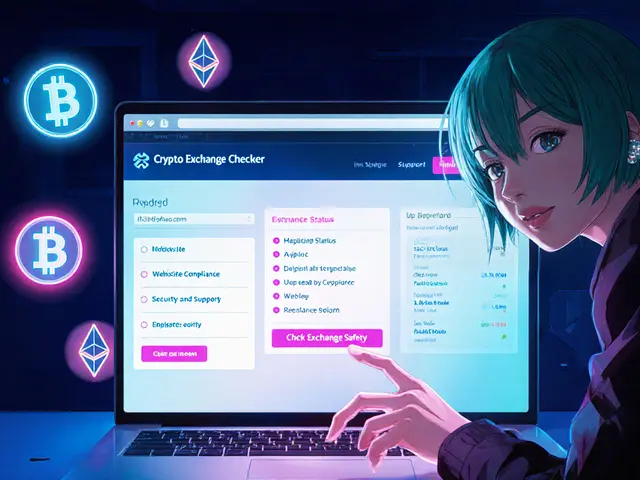Velocimeter vs. Mainstream DEX Comparison Tool
Trust Score: 0
Daily Volume: $0
Active Pairs: 1 (V3) / 6 (Base)
Fee Disclosure: Not Available
Security Audits: None Publicly Available
Trust Score: 9.8
Daily Volume: $1.2B
Active Pairs: ~5,000
Fee: 0.30%
Security Audits: Multiple Third-Party Audits
Trust Score: 9.3
Daily Volume: $380M
Active Pairs: ~2,800
Fee: 0.25%
Security Audits: Published Audit Reports
| Feature | Velocimeter | Uniswap | PancakeSwap |
|---|---|---|---|
| Trust Score (CoinGecko) | 0 | 9.8 | 9.3 |
| Average Daily Volume (USD) | $0 | $1.2B | $380M |
| Active Trading Pairs | 1 (V3) / 6 (Base) | ~5,000 | ~2,800 |
| Swap Fee | Undisclosed | 0.30% | 0.25% |
| Governance Token | VEL | UNI | CAKE |
| Security Audits | None Publicly Available | Multiple | Published Reports |
Quick Takeaways
- Velocimeter shows zero trading activity and a trust score of 0 on CoinGecko as of Sep2025.
- Core features like options token rewards and veNFT governance exist only in promotional material; no public audits or fee schedules are available.
- Compared with Uniswap and PancakeSwap, Velocimeter lacks liquidity, daily volume, and an active community.
- The platform provides no regulatory disclosures, security audit reports, or user‑generated feedback, making it a high‑risk choice.
- For most traders, established DEXes or regulated centralized exchanges remain the safer route.
What is Velocimeter?
When you hear the name Velocimeter is a decentralized exchange (DEX) launched in 2023 that markets itself as a next‑generation DeFi platform with options token rewards and veNFT governance. The project’s own tagline claims it is "the DeFi DEX redefining liquidity with options token rewards." Beyond the tagline, public information about the founding team, roadmap, or launch timeline is scarce.
The platform runs on multiple blockchains, with two visible versions named Velocimeter V3 and Velocimeter Base. Both versions are presented as separate instances of the same DEX architecture, but they share the same branding and tokenomics concepts.
Core technical promises
Velocimeter advertises three headline innovations:
- Options Token Rewards are incentive tokens given to liquidity providers (LPs) based on the performance of option‑style contracts they contribute to.
- veNFT Governance lets users lock up platform tokens to mint voting escrow NFTs, which then confer voting power over protocol parameters and emission schedules.
- Fair launch participation, automated staking, and a "zapping" feature that bundles multiple actions into a single transaction.
While these ideas sound appealing, the platform does not publish any whitepaper, audit report, or detailed fee schedule that would let a trader verify how rewards are calculated or how much is charged per swap.
Trust and performance metrics
Independent data from CoinGecko provides a trust‑score system that aggregates security audits, community sentiment, and on‑chain activity paints a bleak picture. As of September 2025 both Velocimeter V3 and Velocimeter Base have a trust score of 0, the lowest possible rating.
Trading activity is equally stark. Velocimeter V3 lists a single pair-CANTO/SCANTO-but records zero transactions in the past 30 days. Velocimeter Base lists six tokens, with the most active pair BMX‑2/WBLT, yet it also shows no trades in the same period. In contrast, major DEXes log thousands of swaps daily, generating millions of dollars in volume.
The lack of any on‑chain activity suggests that either the platform is effectively dormant or that users are unable to access the core swapping functionality.

How does it stack up against mainstream DEXes?
| Feature | Velocimeter | Uniswap | PancakeSwap |
|---|---|---|---|
| Trust score (CoinGecko) | 0 | 9.8 | 9.3 |
| Average daily volume (USD) | $0 | $1.2B | $380M |
| Active trading pairs | 1 (V3) / 6 (Base) | ~5,000 | ~2,800 |
| Swap fee | Undisclosed | 0.30% | 0.25% |
| Governance token | VEL | UNI | CAKE |
The table makes it clear that Velocimeter lags far behind the industry leaders in every measurable dimension. The missing fee data alone should raise a red flag for any trader who wants to calculate net returns.
Red flags and risk factors
Beyond the raw numbers, several qualitative concerns emerge:
- Regulatory opacity: No licensing information, jurisdiction claims, or compliance statements are publicly available. In a landscape where regulators are tightening rules around DeFi, this omission is risky.
- Security uncertainty: The project has not released any third‑party audit reports. Without a formal audit, the codebase could contain exploitable bugs or backdoors.
- Community vacuum: Major forums-Reddit, Bitcointalk, Telegram groups-show virtually no discussion of Velocimeter. An active community is often the first line of defense against scams and glitches.
- Zero liquidity: The lack of any recent swaps means users would likely face massive slippage or outright transaction failures.
- Promotional placement only: The platform appears on The Magic Store a curated marketplace for Web3 tools as a "top‑tier DeFi tool," yet there is no functional evidence to back that claim.
Collectively, these red flags suggest that the platform may be a stalled project rather than an operational exchange.
Should you consider using Velocimeter?
If you are an early‑adopter who loves to experiment with brand‑new protocols, you might still want to monitor Velocimeter for future updates. However, the prudent approach is to treat the platform as high‑risk and allocate only a tiny, disposable portion of your portfolio-if any.
For anyone looking to earn yield, trade tokens, or participate in governance, you are better served by established DEXes that provide transparent fee structures, audited contracts, and active liquidity pools.
Alternatives with proven track records
Here are three platforms that currently deliver what Velocimeter promises-plus a lot more:
- Uniswap the leading Ethereum‑based DEX with deep liquidity and a robust governance framework.
- PancakeSwap the Binance Smart Chain DEX known for low fees and a thriving community of liquidity providers.
- Centralized exchanges such as Binance or Kraken, which offer regulated custodial services, detailed fee tables, and 24/7 support.
All three provide transparent tokenomics, published audit reports, and active user bases-key ingredients for a trustworthy trading experience.
Next steps and troubleshooting
If you still want to explore Velocimeter, follow this checklist:
- Visit the official website and locate the Velocimeter crypto exchange landing page.
- Check the blockchain explorer for the VEL token contract address and verify that the code has been audited (look for third‑party audit links).
- Attempt a tiny swap (e.g., 0.001ETH) on a testnet-if the transaction fails, abandon further use.
- Monitor CoinGecko daily for any change in the trust score or newly reported volume.
- Stay plugged into community channels-if none appear, treat the platform as inactive.
Remember, the crypto space rewards caution. When a platform offers big promises but provides no data, the safest bet is to walk away.

Frequently Asked Questions
Is Velocimeter a safe place to trade?
Based on current data-zero trade volume, a 0 trust score on CoinGecko, and no public security audits-Velocimeter should be considered unsafe for trading any significant amount of capital.
What are the main features advertised by Velocimeter?
The platform promotes options token rewards for liquidity providers, veNFT‑based governance, automated staking, and a zapping tool that combines multiple actions into a single transaction.
How does Velocimeter's fee structure compare to other DEXes?
Velocimeter does not publish any fee schedule. In contrast, Uniswap charges 0.30% per swap and PancakeSwap charges 0.25%. The lack of disclosed fees makes cost estimation impossible.
Are there any regulatory licenses for Velocimeter?
No regulatory information or licensing details are publicly available, which is a major concern for users in jurisdictions with strict crypto rules.
What should I use instead of Velocimeter?
For reliable swapping, consider Uniswap on Ethereum, PancakeSwap on BSC, or a regulated centralized exchange like Binance or Kraken, all of which provide transparent fees, audited contracts, and active liquidity.







Comments
Jason Brittin
November 24, 2024 AT 11:36 AMWow, Velocimeter looks like the under‑dog of DEXes-if the under‑dog never left its kennel. 🙄 Zero daily volume and a trust score of zero? That's practically a badge of honor for the crypto‑skeptics. At least the marketing team managed to sprinkle in some fancy “options token rewards” and “veNFT governance” to keep the hype machine humming. But without any real trades, those buzzwords are just wallpaper. If you love collecting dead projects for your portfolio, go ahead; otherwise, stick to the swaps that actually execute. 🚀
Amie Wilensky
November 25, 2024 AT 03:00 AMIndeed, the absence of transparent fee disclosures, the lack of audited contracts, and the complete void of on‑chain activity collectively render Velocimeter an academic exercise rather than a functional exchange; consequently, any prudent investor should treat it as a non‑entity, not a platform deserving capital allocation, especially given the current trust‑score of zero, which, according to CoinGecko's methodology, reflects a confluence of security, liquidity, and community deficits.
MD Razu
November 25, 2024 AT 16:53 PMWhen we examine Velocimeter through the lens of systemic risk assessment, several layers of deficiency become evident, beginning with the sheer non‑existence of measurable liquidity, which, in practical terms, means that any attempted swap would likely revert or suffer unacceptable slippage, thereby undermining the very purpose of a decentralized exchange. Moreover, the platform's opaque governance model-veNFT‑based yet without published voting parameters-raises concerns about decision‑making authority and potential centralization of power among unknown token holders. The absence of third‑party security audits compounds this uncertainty, as the codebase could harbor vulnerabilities that are unchecked, a scenario that has historically led to exploit events across the broader DeFi ecosystem. Additionally, the marketing narrative emphasizes “options token rewards,” yet no formula or distribution schedule is disclosed, leaving users in the dark about how returns are calculated or whether they are sustainable. From a regulatory perspective, the platform provides no jurisdictional licensing information, which, in an environment where regulators are increasingly scrutinizing DeFi protocols, adds a layer of legal risk for participants. Community engagement-or the lack thereof-is another red flag; a cursory search across major crypto forums, Reddit, and Telegram yields virtually no active discussion, which suggests either an abandoned project or a deliberate attempt to operate under a veil of anonymity. Liquidity metrics such as daily volume and active pair counts are not merely vanity statistics; they are critical indicators of network effects and user confidence, both of which are conspicuously absent here. The trust score of zero, assigned by CoinGecko-a metric that aggregates audit data, community sentiment, and transaction activity-serves as a quantifiable summary of these deficiencies. Even if one were to adopt a “wait‑and‑see” approach, the practical steps for a meaningful evaluation are hindered by the platform's failure to provide basic documentation, such as a whitepaper or fee schedule, which are standard expectations for any serious DeFi protocol. Consequently, allocating even a nominal portion of one's portfolio to Velocimeter is tantamount to speculative gambling on an unproven and unverified venture. While early adopters sometimes reap outsized rewards from nascent projects, the risk‑reward calculus in this case is heavily skewed toward loss, given the current data landscape. In contrast, established DEXes like Uniswap and PancakeSwap offer transparent fee structures, audited smart contracts, and robust liquidity pools, thereby mitigating the risks outlined above. Thus, for traders seeking reliability and security, the prudent path is to avoid Velocimeter entirely, at least until substantive evidence of functional improvements emerges. Finally, it is worth remembering that in the evolving DeFi space, due diligence is not optional; it is a mandatory safeguard against capital erosion.
Charles Banks Jr.
November 26, 2024 AT 06:46 AMVelocimeter? Sounds like a fancy name for a dead end. If you can't even find a single trade in the last month, why bother? The whole “options token rewards” pitch is just marketing fluff without any real backing. Compare that to Uniswap's solid liquidity and clear fee schedule-it's like comparing a paper crane to a real plane. In short, stay clear unless you enjoy blowing dust.
Ben Dwyer
November 26, 2024 AT 08:10 AMStick to platforms with proven liquidity.
VICKIE MALBRUE
November 26, 2024 AT 20:40 PMEven if Velocimeter looks shaky, there’s always a chance it could turn around.
Michael Wilkinson
November 26, 2024 AT 22:03 PMThat optimism is misplaced; the data shows no activity and zero trust, so betting on a turnaround is reckless.
Billy Krzemien
November 27, 2024 AT 10:33 AMWhen evaluating any DEX, start by checking three core pillars: security audits, liquidity depth, and transparent fee structures. Velocimeter currently fails on all three fronts, which signals a high risk for users. If you’re looking for a safe environment to trade or provide liquidity, stick with platforms that openly publish audit reports and maintain active order books. This approach helps protect your capital and ensures you’re participating in a healthy ecosystem.
Clint Barnett
November 27, 2024 AT 13:20 PMWhile I appreciate the emphasis on fundamentals, let’s not forget that the crypto world loves phoenixes rising from the ashes; however, the current state of Velocimeter resembles a moth trapped in a jar-bright promises, but no room to flutter, no nectar to feed on, and the glass is undeniably thick. Its silence on audits is louder than any hype, and the barren liquidity charts read like a desert landscape under a scorching sun-beautiful in theory but utterly lifeless in practice. Even the most hopeful of us must recognize that without a thriving community, the platform’s governance tokens become little more than decorative badges. So, until the developers pull a rabbit out of that empty hat, treating Velocimeter as a speculative curiosity rather than a reliable trading venue is the wise course.
Jacob Anderson
November 28, 2024 AT 00:26 AMVelocimeter’s “zero trust score” is practically a badge of honor for those who enjoy collecting digital tumbleweeds.
Kate Nicholls
November 28, 2024 AT 01:50 AMWhile the sarcasm hits the mark, it also underscores a serious reality: without activity or audits, the platform offers little more than speculation, and that’s a risk most traders can’t afford.